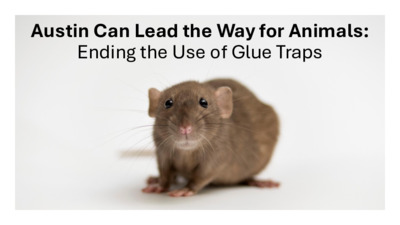Item 4 - Glue Traps Reasons to Stop Using in Austin Operations Presentation — original pdf
Backup

Austin Can Lead the Way for Animals: Ending the Use of Glue Traps What are glue traps? A small board made of carboard, fiberboard or plastic and coated with a sticky adhesive. The glue trap is designed to ensnare any small animal who wanders across or lands on its surface. “One of the cruelest methods of killing animals in existence today…” – People for the Ethical Treatment of Animals (PETA), Glue Trap Fact Sheet. “Responsible for more suffering than virtually any other wildlife control product on the market…” –Humane Society of the United States (HSUS), Glue Boards. Why End the Use of Glue Traps? Five reasons to stop using glue traps in Austin • They inflict immense, prolonged suffering • They are indiscriminate • They are ineffective at addressing the problem • Customers are unaware of the cruelty • The CDC says not to use them Glue traps cause immense, prolonged suffering. Animals trapped in the glue panic and struggle, causing them to become even more stuck. In their desperation to break free, the glue tears off their skin or feathers. Some animals’ faces becomes stuck, leading to suffocation lasting hours. Some break bones or chew off their limbs, desperate to escape. Animals suffer slow, painful deaths and can be thrown in the garbage while still alive. Most trapped animals die of blood loss, shock, suffocation, or dehydration, after days of suffering. They die starved and exhausted. Instructions on glue boards have suggested that the traps be thrown away while the animal is still alive. Simply check reviews on Amazon to understand how inhumane glue traps are. They cause indiscriminate suffering. According to the Wildife Center of Virginia's WILD-ONe database, which collects information from wildlife rehabilitation and animal hospitals, 179 species of wildlife have been documented in glue traps, including some protected species of birds. • Source: Schwirtz, M. (2024, March 28). In New York City, glue traps face scrutiny amid push for humane rodent control. The New York Times. https://www.nytimes.com/2024/03/28/nyregion/glue-trap-rodents-nyc.html They do not solve the problem. The only long-term way to control rodent populations is to make the area unattractive and inaccessible to the animals. The CDC states: “Removing food sources, water, and items that provide shelter for rodents is the best way to prevent contact with rodents.” Consumers are not prepared. People report being unsure of how to handle discovering an animal immobilized on a glue trap. The average person is not equipped to humanely euthanize animals. Some people resort to drowning or bludgeoning the animals. Most people do care about animals, especially when confronted with them in obvious pain, and this is a horrible burden to place on people. The CDC says not to use glue traps. The U.S. Centers for Disease Control and Prevention (CDC) warns the public not to use glue traps. Trapped and frightened animals continue to produce urine and feces through which pathogens like hantavirus can be transmitted. A Growing International Movement Away from Glue Traps 11 100+ Entities Have Stopped Using Glue Traps • Cities: ▪ Cartersville, Georgia ▪ Eugene, Oregon ▪ West Hollywood, California ▪ Ojai, California • U.S. Environmental Protection Agency • U.S. Postal Services • CubeSmart • Public Storage Inc. • U-Haul International • DFW and Dallas Love Field Airports – and more than 100 other airports • Google • Bank of America • Charles Schwab • JPMorgan Chase & Co. • New York City Health and Hospitals Corporation • Chicago Transit Authority • New York Police Department • Metropolitan Museum of Art • Johns Hopkins University, Maryland • … and the list goes on. • Source: PETA, August 2024. Governments With Bans on Glue Traps • England • Iceland • Ireland • Scotland • New Zealand • Wales • Two states and one territory in Australia • More than 30 states and union territories in India • In the United States: • West Hollywood, California • Passed April 2023 • CBS News. (2023, May 23). WeHo bans glue traps for rodent control. CBS News Los Angeles. https://www.cbsnews.com/losangeles/news/weho-bans- glue-traps-for-rodent-control/ • Ojai, California • Passed March 2024 • Vives, R. (2024, March 4). Ojai becomes 2nd U.S. city to ban ‘horrible, indiscriminate killing devices’: glue traps. Los Angeles Times. https://www.latimes.com/california/story/2024-03- 04/ojai-bans-rodent-glue-traps 13 A Cause the Community Can Embrace 14 THANK YOU!